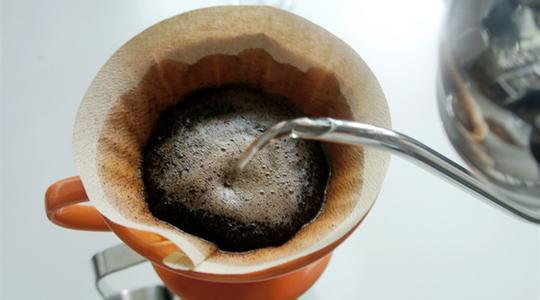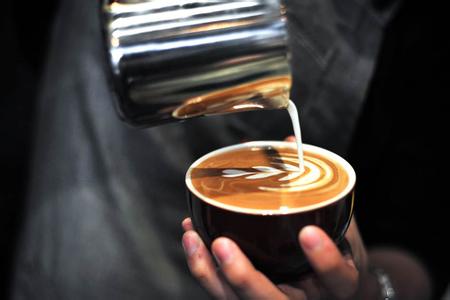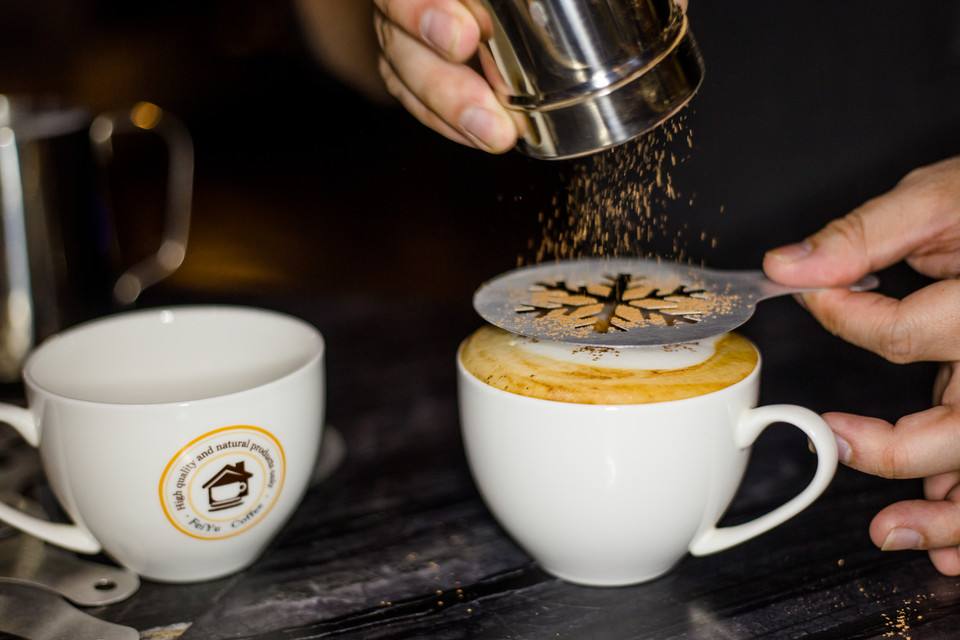The three keys to being a good barista, how to be a good barista?
Follow the caf é (Wechat official account vdailycom) and found that Beautiful Cafe opened a small shop of its own.
When most coffee shop owners hire baristas, the most important thing is not a job seeker who is skilled in brewing coffee. They pay more attention to first impressions, including conversation, appearance and basic knowledge of coffee.
After successful entry into the industry, in addition to coffee knowledge and technology, in fact, many beginners ignore the following three points. If you start to improve yourself from the following aspects, the boss will certainly take a different view.
Be careful: as the air and temperature will change the coffee beans, baristas should always observe the state of the coffee beans. Before blending coffee, the raw materials must be selected and adjusted in order to maintain the taste and taste of the coffee.

Coffee-III
Friendly: even if you can make the best cup of coffee, offending the guests will eventually damage the company's reputation. Therefore, baristas must understand the guests' requirements in a friendly manner in order to win the recognition of the boss.
Save: in addition to helping the boss attract guests, it is also necessary to reduce unnecessary waste. Regardless of milk and coffee, if you can control the amount of each cup and keep it moderate, you will be a competent barista.
Barista promotion ladder
The main job of baristas is to prepare coffee when they enter the industry. after accumulating experience, those with good performance will have the opportunity to take up training and management work.
Salary of general junior baristas: 9K-10k
Coffee dispenser-> Senior Coffee Market dispenser-> Chief Coffee dispenser-> Supervisor-> Manager-> Regional Manager-> Operations Manager
Coffee trainer promotion ladder
Coffee mixer-> experienced coffee blender-> coffee training assistant-> coffee roaster / training manager-> regional coffee training manager
Related readings:
Japanese coffee culture
The first coffee spread to Japan was Nagasaki in the Yuanlu period. And people officially accepted it from the Meiji era. Now let's take a look at the coffee history of Japan. At first, the Japanese were not used to the successive opening of coffee houses in Western Europe, when the literature and art of coffee culture were in bloom, while Japan was in the midst of the strict policy of locking up countries in the Edo era. Coffee, the first drink at that time, was set up at the Dutch store off the island of Nagasaki (1641) and presumed to have been brought in at that time. However, those who can get in touch with foreigners are servants (officials), businessmen, interpreters and tourist girls.
Two or three interpreters of Zunberu's Journey to Japan recorded in 1776 finally knew the delicacy of coffee. The "coffee" that specially spread to the island to symbolize foreign culture could not be popularized at that time. The Japanese drink coffee by the author of the crazy singer and opera in 1804. In the book Qiongpu and Qiongpu, the people of Shushan in Daejeon were invited to drink coffee on a red-haired boat. the beans were fried black and powdered and mixed with white sugar. the bitter smell can not adapt to the bitter taste. Judging from the background in which coffee is imported from the island and is not widely accepted, the policy of locking up the country has indeed affected the Japanese people's unaccustomed to the taste of the new drinks.
Sisamert, who went to the Dutch residence on the island in Japan in 1823, seems to like coffee. In the book "Edo to visit the House", it is recorded that "when the Japanese get along with us, they like to drink coffee."
The real popularity began in the middle of Meiji. Members of the founding literary magazine Hiroshi Kitahara, Woodpecker Ishikawa, Kwangtaro Takamura, Haruo Sato, and Hefeng Nagai meet each month at the "Hung Nest" venue in Hashimachi, Japan. In that shop, you can drink authentic French cuisine and foreign wine, and coffee is also authentic French deep-roasted coffee. The nest of Hong is like a social field for literati.
From the Meiji era to the Taisho era, cultural salons like this did help create several coffee houses, and Japan finally entered the culture of coffee. However, it is still a rare shop for ordinary people.
The coffee salon formed at that time is a social place for literati or literary youth, but at the same time affordable coffee houses are unwittingly popular. In the heyday of the Taisho era, there were more than 20 branches across the country. Why is the coffee salon so popular? Because the coffee in the high-end western restaurant cost 15 yuan at that time, while imitating the coffee shop in Paris or New York, a cup of low-priced coffee with 5 yuan was thoroughly implemented. So you can have authentic and fragrant Brazilian coffee at a price of 1/3. In the national well-known coffee salon, it is hard to count the Japanese who have tasted delicious coffee. Coffee salon has left an indelible contribution to popular coffee.
In the Taisho era, the number of coffee lovers did increase a lot, and it became more popular in the Showa era, but World War II stopped importing coffee because it was an "enemy drink." In Japanese life, coffee disappeared for a moment. Coffee is appreciated and loved by people as "messengers of peace".
At present, the competition in the Japanese coffee market is very fierce. Including tea shop and family coffee and instant coffee, home coffee and office coffee, all kinds of canned coffee, plus hospitality coffee, delicious coffee and so on. In particular, the more authentic demand for coffee in the Pyeongcheng era has also increased.
Important Notice :
前街咖啡 FrontStreet Coffee has moved to new addredd:
FrontStreet Coffee Address: 315,Donghua East Road,GuangZhou
Tel:020 38364473
- Prev

Baristas enter the bitter history, not everyone can do it!
1. It is easier to be scalded by boiling water and steam than to win a lottery. A pot of good tea is about "boiling tea with water", and coffee is no exception. Baristas work around the water bar every day, making coffee tools, kettles and electric stoves everywhere, and the environment is no longer comfortable. In addition, baristas have to make at least ten pots of hot water and make more than a hundred cups of coffee every day. If they are not careful, they will be boiled and steamed.
- Next

From apprentice to barista, the introduction begins with coffee beans.
Follow the caf é (Wechat official account vdailycom) and found that Beautiful Cafe opened a small shop of its own and wanted to be a barista. You should know that coffee is no stranger to Hong Kong people, and there are countless fans. Some people like to taste it, others love to study it, but there are not many people who love it so much that they give up their original job, join the coffee industry, and then become their own career.
Related
- What is the meaning of lactic acid fermentation with coffee bean treatment?
- How to judge the state of foam by sound?
- How does the latte pull out the unicorn pattern? Come to get for a little trick to improve the flower pull!
- Will flower pulling affect the taste of the latte?
- Do you know the history of coffee?
- The difference between honey treatment and sun washing what is raisin honey treatment?
- What kind of milk can a novice use to make coffee foam to keep the foam longer? The correct method and skills of milking tutorial sharing
- Why do washed coffee beans taste sour? Flavor characteristics of washed Coffee
- Introduction to the skill of how to practice the size and height of water injection around the circle of hand-brewed coffee
- How do beginners practice coffee flower drawing from scratch?

